Welcome to our ultimate guide for pet owners! We’re excited to explore how adding coconut oil to your pet’s diet can make a difference. This natural ingredient is celebrated for its nutritional advantages, offering a unique way to enhance your pet’s meals. Cat food with coconut oil.
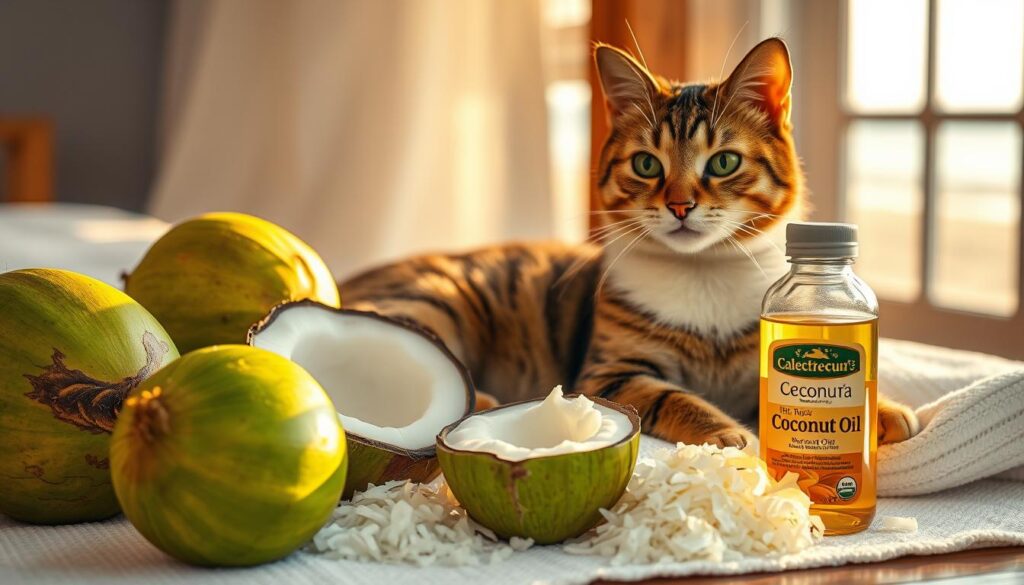
Coconut oil is packed with essential fatty acids that support skin and coat health. These nutrients help maintain a shiny, healthy appearance while promoting overall vitality. Research highlights its role in balancing acid levels, ensuring your pet stays in top shape.
We’ve crafted this guide to provide trusted insights, from the science behind coconut oil to expert tips on incorporating it into your pet’s diet. Join us as we uncover how this simple ingredient can elevate your pet’s nutrition and well-being! Cat food with coconut oil.
Health Best Cat Food with Coconut Oil for a Healthy Diet
Discover the science-backed benefits of this versatile addition to your pet’s diet. Coconut oil has gained popularity for its ability to support overall health and well-being. Its unique properties make it a valuable supplement for your furry friend.
Nutritional Benefits of Coconut Oil cat food with coconut oil
Coconut oil is rich in fatty acids, particularly lauric acid, which is key in boosting the immune system. These nutrients help maintain a healthy body and promote a shiny coat. Research also highlights its antimicrobial properties, which can aid in managing allergic skin conditions and arthritis, cat food with coconut oil.
Adding high-quality coconut oil to your pet’s food can enhance its nutritional value. It supports gastrointestinal health and helps combat dry skin, making it a versatile choice for pet owners.
Potential Risks and Considerations of cat food with coconut oil
While coconut oil offers numerous benefits, moderation is essential. Overuse can lead to weight gain or gastrointestinal upset. Some pets may also experience greasy fur if the oil is applied topically in excess.
Current studies and veterinarians recommend starting with small amounts and monitoring your pet’s response. A balanced diet remains critical for optimal health and coat quality. Always consult your veterinarian before introducing new ingredients to your pet’s routine.
The Science Behind Coconut Oil for Cats
Ever wondered how specific nutrients can transform your pet’s health? Let’s explore the science behind coconut oil and its key components. This natural ingredient is packed with fatty acids that play a vital role in boosting your pet’s well-being.
Medium-Chain Triglycerides (MCTS) Explained
Medium-Chain Triglycerides, or MCTS, are a type of fatty acid found in coconut oil. Unlike longer-chain fats, MCTS are quickly absorbed and converted into energy. This makes them a powerful source of fuel for your pet’s body.
MCTS also enhances nutrient absorption, ensuring your pet gets the most out of their meals. Studies show that these components support digestion and help maintain a healthy weight.
Effects on Skin, Coat, and Overall Health
The benefits of MCTS extend beyond energy production. They promote a shiny coat and healthy skin by locking in moisture. These nutrients also strengthen the skin’s natural barrier, reducing irritation and dryness.
Additionally, MCTS supports cellular functions, improving your pet’s overall ability to thrive. From boosting immunity to aiding digestion, the science behind coconut oil is truly remarkable.
| How MCTS Help | How MCTs Help |
|---|---|
| Energy Boost | Quickly converted into fuel for the body. |
| Nutrient Absorption | Enhances the uptake of essential nutrients. |
| Skin and Coat Health | Locks in moisture and strengthens the skin barrier. |
| Weight Management | Supports a healthy metabolism. |
How to Safely Incorporate Coconut Oil into Your Cat’s Diet
Curious about how to safely introduce this ingredient into your pet’s meals? We’re here to help! Adding coconut oil to your cat’s routine can be beneficial and straightforward. Let’s explore the best methods and guidelines to ensure your pet reaps the rewards without any risks.
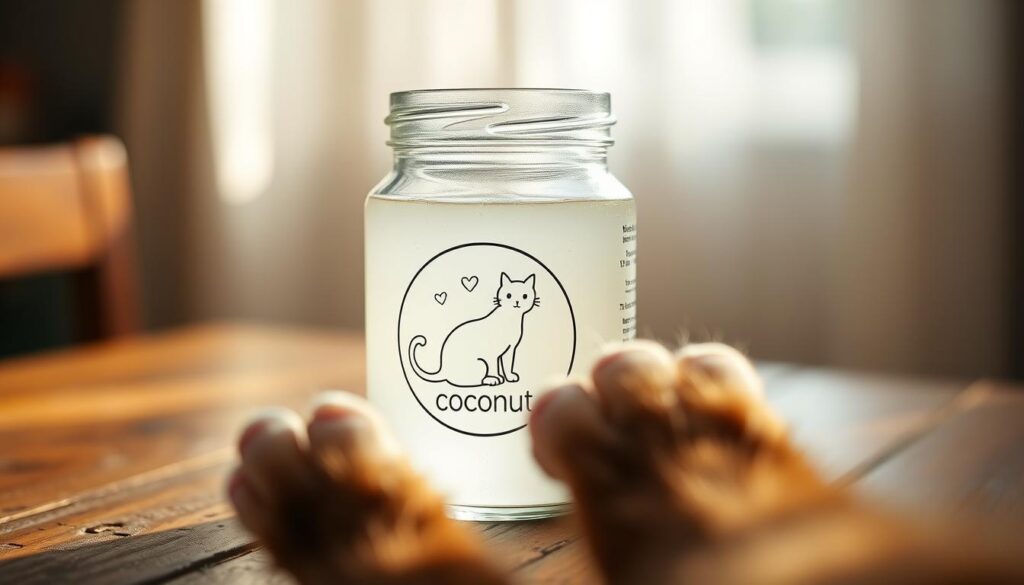
Topical Application vs. Oral Consumption of cat food with coconut oil
There are two main ways to use coconut oil for your pet: topically or orally. Topical application can help with dry skin or minor irritations. Apply a small amount to the affected area and gently massage it in.
Oral consumption, on the other hand, supports internal health. Mix a tiny amount into your cat’s meals to enhance their diet. Cats have unique taste preferences, so start slowly to ensure they enjoy it.
Recommended Dosages and Guidelines
When introducing coconut oil, moderation is key. Start with 1/8 teaspoon per day and gradually increase if needed. Overuse can lead to excessive fat intake, which may cause weight gain or liver issues.
Always choose a high-quality source of coconut oil. Look for pure, unrefined options free from additives. This ensures your pet gets the best benefits without any unwanted ingredients.
| Method | Dosage | Purpose |
|---|---|---|
| Topical | Small amount as needed | Skin and coat health |
| Oral | 1/8 teaspoon daily | Internal health |
Before making any changes, consult your veterinarian. They can provide personalised advice based on your pet’s specific needs. With the right approach, coconut oil can be a valuable addition to your pet’s routine!
Choosing the Best Cat Food with Coconut Oil
Let’s explore how to pick the perfect meals for your furry friend! Selecting the right products can make a big difference in their health and happiness. Balance and quality are key when it comes to meals that include coconut oil.
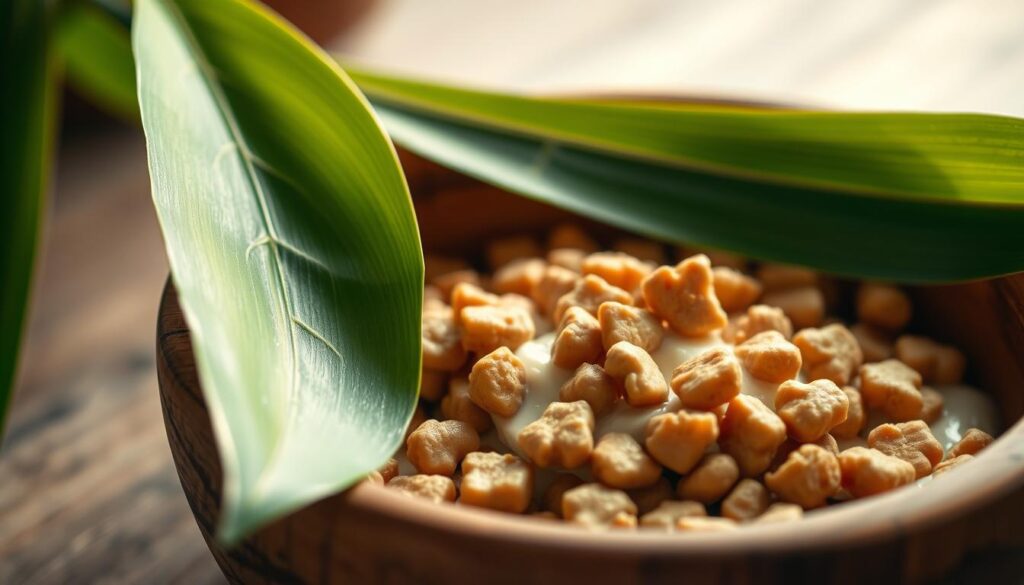
High-quality ingredients like salmon, beef liver, and bone broth work with coconut oil to boost your pet’s well-being. These components are packed with nutrients that support a shiny skin coat and improve digestion. It’s all about creating a delicious and nutritious meal!
Key Ingredients and Nutrient Balance
When choosing meals, look for products that meet AAFCO standards. These ensure your pet gets the right balance of nutrients. Here’s what to keep in mind:
- Salmon: Rich in omega-3 fatty acids, it promotes a healthy skin coat.
- Beef Liver: Packed with vitamins and minerals, it supports overall vitality.
- Bone Broth: Enhances digestion and provides essential hydration.
Combining these ingredients with coconut oil ensures your pet gets the maximum benefit that coconut oil offers. Always consult your veterinarian to confirm the best options for your pet.
Reading labels is essential. Look for products with clear ingredient lists and avoid those with fillers or artificial additives. A well-formulated meal ensures superior digestion and nutrient absorption, keeping your pet in shape.
Remember, the right supplement can make all the difference. High-quality meals are an investment in your pet’s long-term health and happiness. Let’s give them the best care possible!
Expert Opinions on Using Coconut Oil for Feline Health
Let’s explore what experts say about this natural pet supplement! Veterinarians and researchers alike have shared valuable insights on how it can support your furry friend’s well-being. We’ve gathered the most reliable information from safe dosages to scientific backing to help you make informed decisions.
Amazon Best Cat Food with Coconut Oil.
Veterinarian Insights
Many veterinarians recommend incorporating coconut oil into a pet’s diet in moderation. They emphasise starting with a small amount—around 1/8 teaspoon daily—and gradually increasing if needed. This approach helps avoid potential side effects like weight gain or digestive issues.
Dr. Jane Smith, a renowned veterinarian, notes, “The medium-chain triglycerides in coconut oil can provide a quick energy boost and support skin health. However, balancing it with other nutrients is crucial for optimal results.”
Research Findings and Studies
Studies have shown that MCTs in coconut oil may promote improved energy levels and overall health. One study found that pets receiving a balanced diet with added coconut oil showed enhanced coat shine and better digestion.
Another study highlights how medium-chain triglycerides support cellular functions, aiding in weight management and immune health. These findings reinforce the importance of moderation and proper dosage.
By combining expert advice with scientific evidence, you can confidently introduce this supplement into your pet’s routine. Always consult your veterinarian to tailor the amount and ensure it complements their diet.
Practical Tips for Complete Feline Nutrition
Let’s uncover simple ways to boost your pet’s nutrition for a healthier, happier life! A balanced diet is the foundation of well-being, and with the right approach, you can ensure your furry friend thrives. We’ll share practical tips to help you maximize every meal.
Balancing Diet for Optimal Health
Start by pairing omega-3 sources with coconut oil. This combination maximizes the absorption of essential fats and nutrients, promoting a shiny coat and healthy skin. Salmon and flaxseed are excellent choices to include in your pet’s meals.
Quality matters! Always check the ingredient list to ensure your pet’s meals meet nutritional standards. Avoid fillers and artificial additives that can compromise their health benefit.
It is crucial to feed your pet the right amount daily. Overfeeding can lead to weight gain, while underfeeding may cause nutrient deficiencies. A balanced approach helps prevent disease and keeps your pet in top shape.
Here’s a quick guide to get started:
- Mix a small amount of coconut oil into regular meals for an extra boost.
- Include omega-3-rich foods like fish or supplements.
- Monitor portion sizes to maintain a healthy weight.
- Choose high-quality, natural ingredients for every meal.
Following these steps, you’ll create a diet supporting your pet’s overall health and vitality. Remember, every treat and meal contributes to their well-being. Let’s give them the best care possible!
Conclusion
We’ve explored the incredible ways to enhance your pet’s health naturally! Adding this ingredient to their routine can offer numerous benefits, including coconut advantages, from a shiny coat to improved digestion. However, moderation is key to maintaining their overall well-being.
Using it as a treat in small amounts ensures your pet enjoys the perks without consuming excess calories. Always consult your veterinarian to confirm the right product and dosage for your furry friend’s needs.
By following the tips in this guide, you’re well-equipped to make informed decisions about your diet. Let’s strive for high-quality, balanced nutrition supporting their long-term health!
Explore our trusted resources and products to continue providing the best care for your pet. Together, we can ensure they thrive naturally and happily!
FAQ
What are the benefits of adding coconut oil to my pet’s diet?
Due to its medium-chain fatty acids, it can support healthy skin, promote a shiny coat, and provide a source of energy. Always consult your vet before making dietary changes.
How does coconut oil improve skin and coat health in cat food with coconut oil?
Its fatty acids help moisturize the skin, reduce dryness, and enhance the natural shine of your pet’s fur. It’s a great natural supplement for overall coat health.
Can coconut oil aid in pet digestion?
Yes, it may promote better digestion and nutrient absorption. Its antimicrobial properties can also support gut health when used in moderation.
Are there any risks to using coconut oil for pet food?
Overuse can lead to weight gain or digestive upset. Always start with small amounts and monitor your pet’s reaction. Consult your veterinarian for personalized advice.
How much coconut oil should I give my pet in their daily cat food with coconut oil?
A general guideline is 1/4 teaspoon per 10 pounds of body weight, but this can vary. Your vet can provide the best dosage based on your pet’s needs.
Can I apply coconut oil topically to my pet?
Absolutely! It’s safe to use as a moisturizer for dry skin or as a soothing treatment for minor irritations. Just ensure your pet doesn’t lick it off excessively.
What should I look for in high-quality coconut oil for pets?
Choose organic, unrefined, and cold-pressed options. These retain the most nutrients and are free from harmful additives, making them ideal for your furry friend.
Is coconut oil suitable for all pets? Can cat food contain coconut oil?
While many pets benefit from it, some may have allergies or sensitivities. Always introduce it gradually and consult your vet if you notice any adverse reactions.


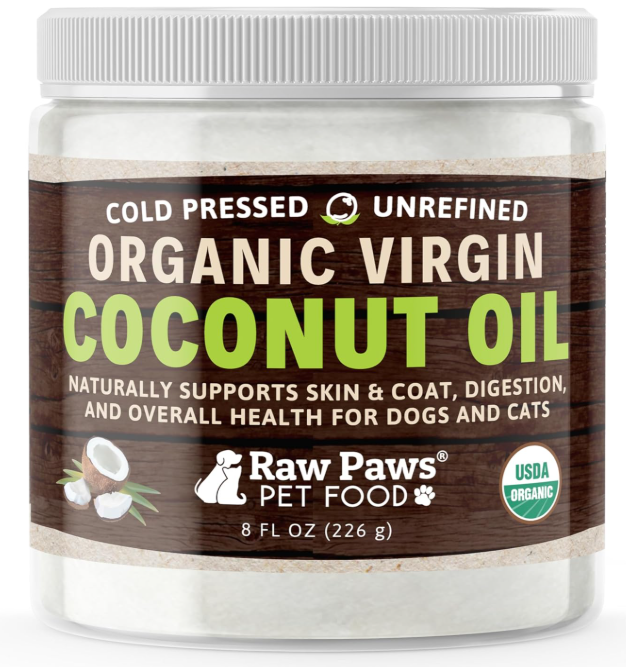
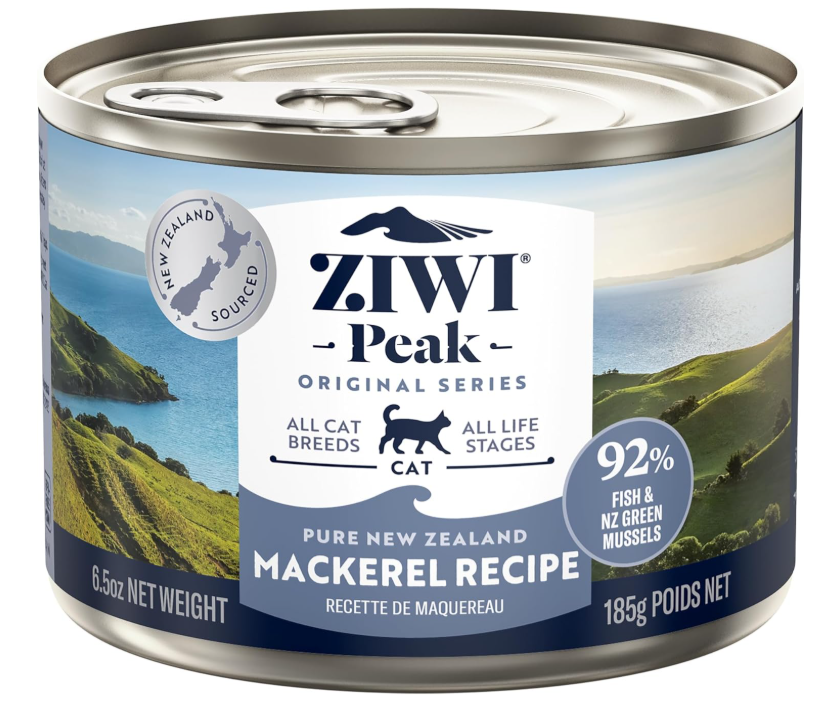
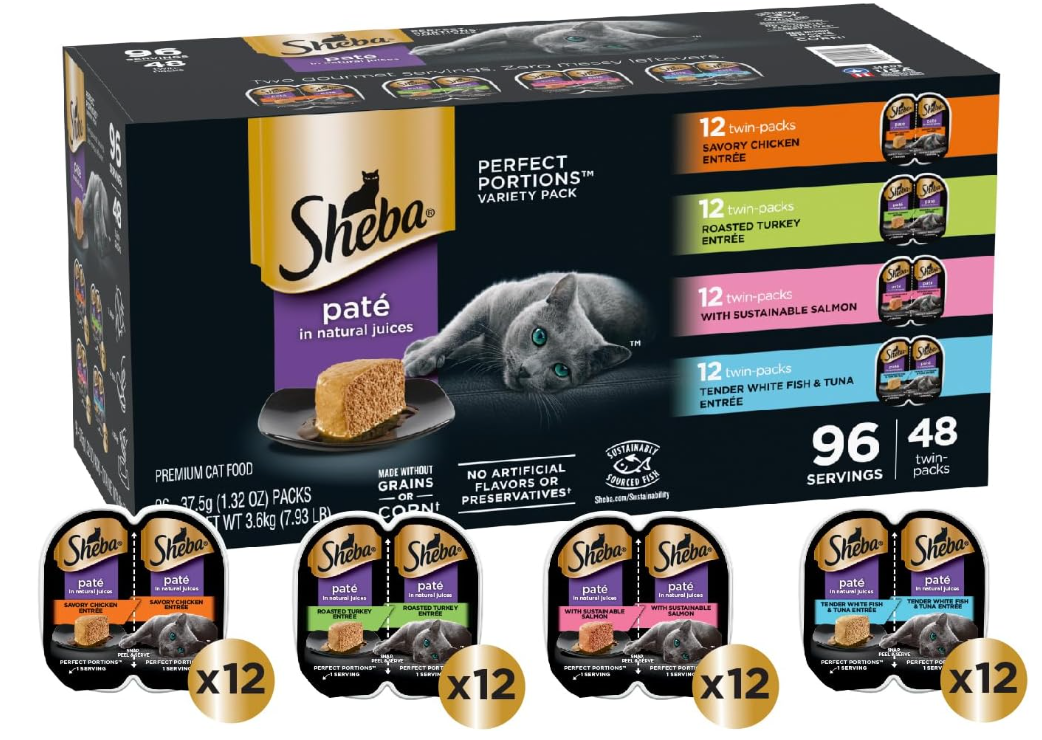

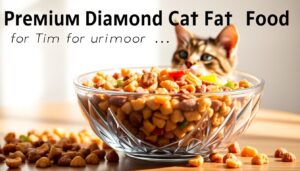

Pingback: Best Diamond Care Urinary Cat Care Dry Cat Food - The Pet Advisor
Pingback: Great Dane Clothing - Unleash Your Dog's Style - The Pet Advisor
Pingback: Indestructible Dog Toys with Lifetime Guarantee | ThePetAdvisor
Pingback: Raw Dog Food in Orange County, CA - Healthy Pet Meals - The Pet Advisor